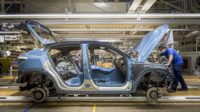DETROIT—General Motors, Honda and Toyota rank highest in the 2023 North American Automotive OEM-Supplier Working Relations Index (WRI) Study conducted by Plante Moran. Ford, Nissan and Stellantis received lower grades in most categories. However, the shift to electric vehicles is creating tension throughout the entire auto industry.
The WRI measures the “total commercial relationship”, which is a function of perceived trust, timely communication, mutual profit opportunity, assistance and a reduction in friction in dealings with automakers.
The 23rd annual study shows rising tension in the auto industry over increased risk related to short-term cost recovery issues, production scheduling and supply chain disruptions as the industry transitions to electric vehicles.
These challenges are compounded by long-term strategic issues that suppliers have related to adequate insight into automakers’ EV strategy and timing so they can effectively plan for the transition in terms of capital, acquisitions and staffing investment.
With the overall industry undergoing major changes because of EVs, suppliers identified several common issues critical to OEM success:
*There can’t be a disconnect between OEM senior management’s words and front-line buyers’ actions.
*OEMs need to ensure purchasing staffs have the experience and training to understand new EV technologies, and internal relationships to engage with engineering and manufacturing as the OEMs conduct staff reductions and reorganizations.
*OEM’s product plans and technology requirements need to be articulated and communicated to suppliers so that they know where they and their products fit into long-term strategies.
*OEM decision-making locations need to be located near, and reinforce where, supplier sourcing and manufacturing occurs.
“The industry continues to face unprecedented challenges in the shift to EVs that unless effectively addressed will only get worse,” warns Dave Andrea, principal in Plante Moran's strategy and automotive and mobility consulting practice, which conducts the annual study.
“During COVID-19, a ‘war room’ approach was adopted to quickly resolve critical issues,” says Andrea. “That approach is what auto manufacturers need to maintain during the transition to EV technologies. The industry needs that level of collaboration, even without the pressure of a crisis.”
According to Andrea, “purchasing effectiveness” is an important overall measure. Honda ranks No. 1, followed by GM and Toyota. Purchasing effectiveness involves timely communication, resolving issues and buyer accessibility, among other factors.
“Automakers will have to continue building on these fundamentals to survive near-term parts shortages, rising costs and high risk to truly deepen supplier relations to support their transition to electric vehicles,” claims Andrea.
“The study has shown trust and communication to be the cornerstones of good working relations, especially in the high-risk environment automakers and suppliers are now dealing with,” explains Andrea. “Billions of dollars and thousands of jobs are at stake.”
Andrea says “trust” is based on three factors: having the OEM customer set realistic expectations, delivering on commitments and sharing information on the OEM’s long-term purchasing strategy on a timely basis.
“All six of the OEMs need to improve in this important area,” says Andrea. “In the current high-risk business environment, communication is key, because the supplier CEOs must ask: ‘Who would I rather do business with? Who is my customer of choice?’
“The answer comes down to three questions: ‘Who do I trust? Where will I get the best return on investment? What is the prospect for future business?,’” adds Andrea. “So, it’s in the OEM’s best interest to maintain open and honest communication with its suppliers.”






